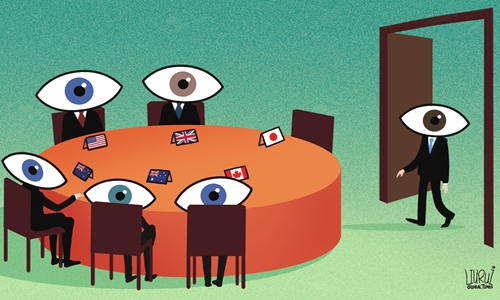Will Japan become Five Eyes' 'sixth eye'?
By Wang Guangtao Source: Global Times Published: 2020/8/16 15:03:40
Will Japan become Five Eyes’ 'sixth eye'?

Illustration: Liu Rui/GT
Japan's prospects of becoming a member of the "Five Eyes" intelligence-sharing alliance have been hotly debated. With strategic competition between China and the US intensifying, the US is hoping to contain China in terms of intelligence and information. The "Five Eyes" is traditionally an intelligence-sharing alliance consisting of five "Anglo-Saxon" countries. It played a vital role in the confrontation between the US and the UK against the Soviet Union and other socialist countries during the Cold War. And yet today, Japan evokes memories of the deeply condemned Cold War by sending the message that it could possibly join this nefarious alliance.
Indeed, it is not new for Tokyo to want to tune into the alliance. Two years ago, the US reached out to Japan in face of the nuclear crisis on the Korean Peninsula. Washington expressed its will to strengthen cooperation between the "Five Eyes" and Japan, South Korea, France and Germany. However, the relationship between South Korea and Japan has deteriorated due to economic and historical issues and it was difficult to include both in the "Five Eyes" alliance.
In 2020, the China-US strategic competition continues to intensify. This has forced the US and the UK to reach out to Japan once again and ganging up against China has become these countries' common goal. At the end of July, Japanese Defense Minister Taro Kono said Japan would welcome an invitation to join the Five Eyes intelligence alliance. Later, Japanese Minister of Foreign Affairs Toshimitsu Motegi visited the UK. It remains unknown whether the Japan-UK foreign ministers' meeting has covered the issue of "Five Eyes". But given Britain's recent criticism on China's National Security Law for Hong Kong, it might not be that surprising if London would count on Tokyo to provide intelligence against Beijing.
There is no doubt that in the future, Japan will expand intelligence exchanges with Britain, Australia and other countries. It will certainly strengthen its military relations with the US. For now, Japan has established the "2+2" (diplomacy plus national security) dialogue mechanism with seven countries, including three countries in the "Five Eyes" (namely the US, the UK and Australia). This is the foundation on which Japan could deepen cooperation with these countries in respect to intelligence sharing. Nevertheless, it does not necessarily mean that Japan will join the "Five Eyes" alliance led by US and become a "sixth eye".
First of all, the "Five Eyes" alliance was originally formed by English-speaking countries. Once Japan joins the alliance, countries that claim the same ideologies such as South Korea, Germany, France and Italy will have full grounds to participate in the alliance too. For an intelligence-sharing organization, more members mean more access to diverse information. But it also means a higher risk of exposure. Adding Japan to the alliance as a "sixth eye" is not merely an issue of adding a new member. It also implies reorganization of operation and language systems. It is beyond the core circle of "Five Eyes" and is presumably not what the founding nations were expecting.
Second, be it "Five Eyes" or "Six Eyes", such an alliance reminds the world of the Cold War. In those awful days, countries were forced to take sides and confront one another. The US has previously sent invitations to Germany and France. Even as both "free and democratic" nations and NATO members, the two countries did not express much intent to join the alliance. Therefore, Japan's active response might not be acknowledged by the entire international community.
Third, Tokyo has not reached a consensus on the matter. Part of Japan has never stopped calling for strategic autonomy. Yet integrating its own intelligence system into the "Five Eyes" will no doubt further subordinate Japan to the US. Also, Japan's China policy differs from the other five countries. It takes precautions against China, but it also needs coordination with China. The "Five Eyes" has a clear target of "containing China". This is obviously a dilemma for Tokyo. In the end, Japan needs to weigh between the benefits brought by joining the alliance and the losses caused by deteriorating China-Japan relations.
For China, what matters most is not the number of the "eyes" in this system. In terms of intelligence-sharing, the content always counts more than the form. Even if Japan has not yet officially become a "sixth eye," it has in essence strengthened cooperation with the member states. China should be fully alert and prepare well-rounded countermeasures.
The author is an associate research fellow at the Center for Japanese Studies, Fudan University. opinion@globaltimes.com.cn
Posted in: VIEWPOINT,OTHER REGIONS